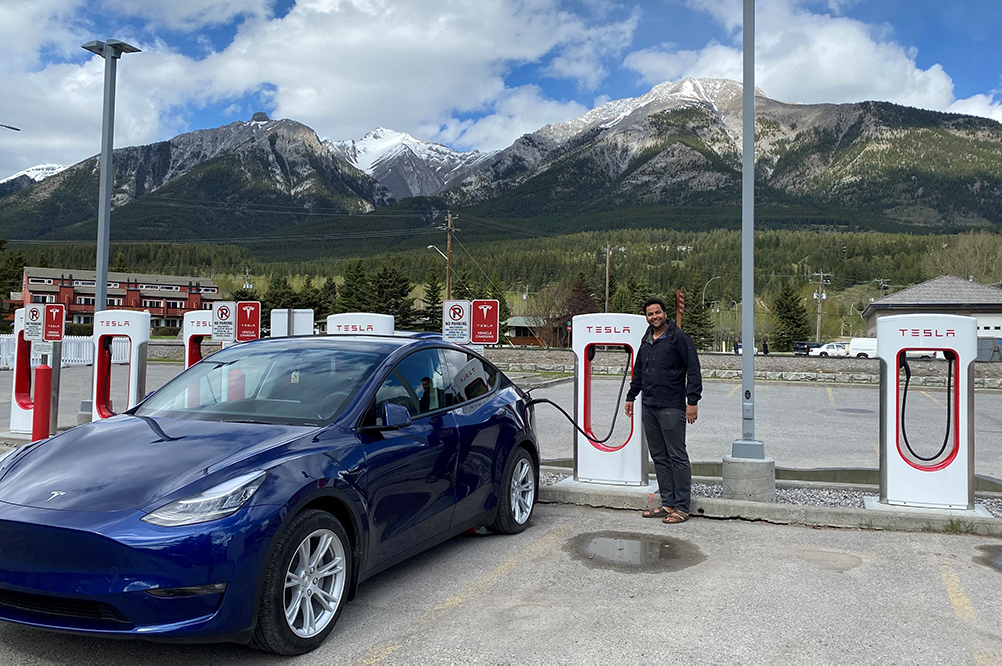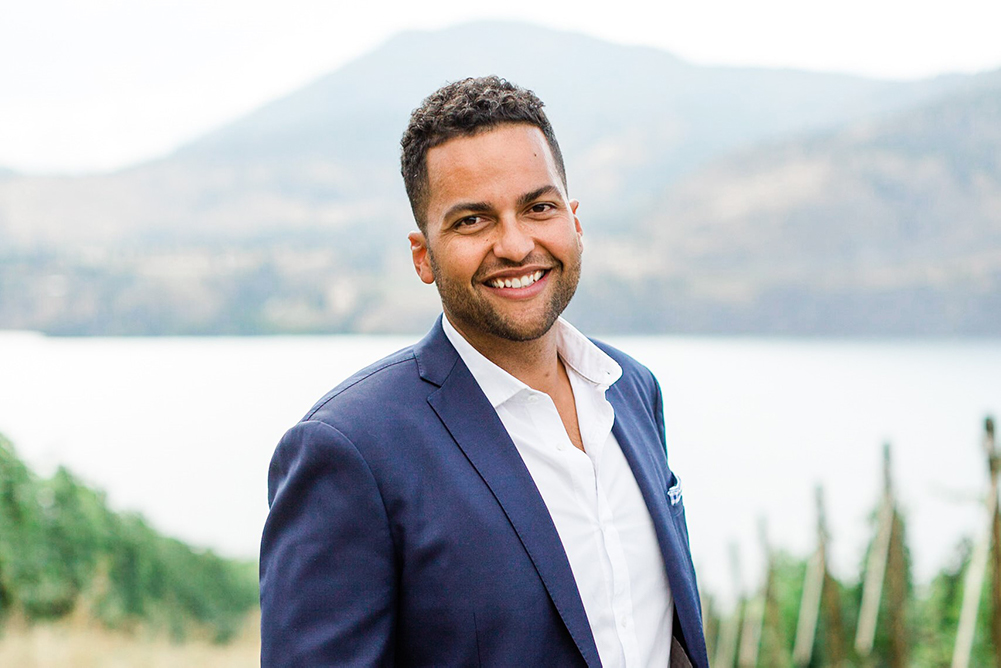Zhaodi Culbreath, Sc’08, made his way through many different industries and has taken on a wide variety of projects and jobs over the last decade and a half. He has experience in everything from consulting to management, both inside and outside of core engineering.
In this Q&A, we learn about the unique experiences Zhaodi has had, what it means to be a pioneer in the emerging field of Electric Vehicle (EV) charging station development, and how his experiences at Queen’s affects how he views and interacts with the communities and organizations around him today.
What is a Charging Infrastructure Market Lead?
In my current role I manage the growth and development of Tesla’s public electric vehicle charging network in Western Canada. Ultimately, we are trying to figure out where these charging stations need to be to support the needs of EV drivers right now and into the future.
Each day can be quite varied, often splitting my time between developing new relationships with potential property hosts for charging stations and having discussions with stakeholder groups to support EV adoption. Discussions often range from those with folks who are more interested in the technical side of EV charging, while others are curious about how EV adoption will be changing over time and the impacts this will have. In addition, a week will not go by without a trip to a parking lot or two to site new charging station locations. I also spend time within Tesla working on diversity, equity, and inclusion within our North American charging organization as we try to translate the broader goals of Tesla as a global company into tangible ways to support our team and the growth of the charging network. The fact that every day is so different is the thing that keeps this job exciting and unique.
Why did you decide to study/go into Civil Engineering?
The short answer was that I was trying to avoid the subjects that were not clicking with my brain, like fluid dynamics. More broadly, Civil Engineering had always been described to me as a balanced discipline, in that it combined elements of engineering from a design and calculations standpoint with other important elements such as project management and stakeholder interaction. Hearing about some of the fourth-year design projects where you would be working with industry and learning all these important soft skills really appealed to me and pushed me into Civil Engineering.
What was your career path? Internships/first job?
I went through university without any specific engineering work experience. I spent summers working for a wide range of opportunities like running a sports program at a summer camp in Algonquin Park and working for Queen’s for the Office of Advancement team. I got a chance to get involved with homecoming and met a ton of alumni in the community. I managed the Tea Room one year through the summer, where I was trying to work out the kinks in bringing the shop into its second year in operation. After convocation, I spent a year teaching at a middle school overseas in South Korea where I had the chance to support their public education system as a native English speaker.
After coming back to Canada, I told myself that I need to get back in Civil Engineering. At this point, it is 2009, and the many industries were still recovering from the global financial crisis. I ended up applying for an engineer in training program at Enbridge Gas Distribution, where I spent six years rotating through a series of different roles, doing everything from pipeline design and construction to asset management. From there, I moved to Calgary where I took a gig working for a consulting company where I was responsible for supporting clients who had challenging projects in a wide range of industries. I spent time building new public schools, working on mining projects and on Vancouver Island where I expand on of the largest fish hatcheries in Canada.
From there, I had always had my eye on transitioning into a role in the renewable energy industry, while trying to still keeping my finger on infrastructure and the civil engineering I had studied in school. This goal, and some serious luck, led me to the opportunity at Tesla to support the growth of the Tesla Supercharging network across Western Canada.
What is your greatest success so far in the industry?
I would say the coolest thing that I have done to date was supporting the opening of the Trans Canada Supercharger Network. The goal of driving coast to coast in Canada on a fast charging network was pretty exciting and on December 24th, 2019 we flipped the proverbial switch on the remaining sites to enable Teslas to drive between Victoria and Halifax on the Tesla Supercharger Network.
Before this, people were able to make the trip in their EV, but the charging that was available was intermittent and very slow. Now, you can make the trip on a fast-charging network which I think stands out as an amazing accomplishment, especially when you are making your way through an emerging field and working for a pioneering organization.

What did you wish you knew before entering the workforce?
I wish I better took the advice of those that said not to stress so much over the choices you make in university, as they won’t set your forever trajectory. It’s true that asking yourself ‘What are you going to study?’ or ‘Where are you going to go?’ are some of the most important questions in your twenty-year-old brain, and it’s reasonable to think all of this is the biggest deal in the moment. However, in hindsight, no one is currently paying attention to courses I chose in undergrad. They were more focused on what I am doing right now and how I’ve gotten here. I am not trying to say that you shouldn’t pay any attention to the decisions you make when you’re young and in university. Rather, you should make the best choices you can in the moment, and keep in mind, like with all decisions you make, you can always make a new one and follow a new path from there.
I definitely felt the pressure to make the right choices, because if I didn’t set myself on a certain trajectory in undergrad then I would never be able to feel satisfied in my career. When I look back, I’ve spent the last 8 years of my career doing work that I did not know existed when I was in undergrad, and I’ve spent the last 4 years in a line of work that didn’t even exist the way it does today. When I was in university, I was routinely asked questions like ‘What did you do for your internship?’ or ‘What are your plans for the future?’, and I felt real pressure to pursue a co-op or internship program in my field. These are certainly great opportunities for some, but they weren’t in my cards and that wasn’t detrimental to my overall career success. Looking back on that, I’ve managed to leverage my coffee shop and teaching experiences in more ways than I think I would have been able to designing a storm drain for a few months. To capture it, taking a deep breath on some of those decisions is important because while those decisions do have an impact, it’s not as much as you think in the moment.
How has your time at Queen’s shaped your career?
I think Queen’s was an opportunity for me to understand and appreciate a sense of community. The people around me were what mattered to me the most in my undergrad. That also comes with the acknowledgement that the community around me was very specific and wasn’t diverse, and that some pieces of it weren’t what they could have been. I am certainly getting better acknowledging that in hindsight. I can think back and assess some of the challenges that I faced in that community, and that has given me an idea of how to better engage with diversity, equity, and inclusion within my organization and other spheres I influence. In short, I find it important to relive the fond and transformational experiences I had at Queen’s, while also trying to grapple with some of the more gritty challenges that were embedded in that experience. My time at Queen’s shaped my passion for the people I work with, and it’s through reflection that I have found real meaning in growing more inclusive communities around me.
How does ethics play a role in your career?
I think within the engineering space, ethics was initially taught to me in terms of completing my Professional Engineering designation, and through this, you get a very specific flavor of ethics, which is tied to the responsibility you have within the profession. When you are responsible for a design you must make sure that it’s safe and robust, and it’s your duty to uphold that through the technical attributes of the design. When I moved away from doing core engineering, those underpinnings of ethics that tied my responsibilities changed. Now I feel I have a responsibility to make our planet safer and more enjoyable to live on to support future generations, and I bring these underpinnings to an industry that I think is really going to support that.
In my line of work, there is more to ethics than the traditional engineering flavor. We make sure that we are deploying EV charging infrastructure in a responsible and equitable way and that we are not just pushing an industry agenda without considering other costs and implications, even if it’s not mandated or explicit. I think all these things are fundamentally tied to ethics.

What personal characteristics do you feel are necessary to be a successful engineer/manager/consultant?
The top personal characteristic that I would encourage the most is to be empathetic. I think that empathy as a response allows you as an individual to see the best in the people around you and allows you to be open and supportive of them.
The desire to be a giving person is also a strong characteristic. There are different times in your life when you will look to others for support. You need support from your parents and caregivers when growing up, or from your first managers when you start your career. You can always find opportunities to give back, as we engage with our communities. Things like early career professionals, industry groups or even the small favors that you do for your friends and neighbors. Trying to give back to those around you when you can is important to fostering stronger relationships and creating more good.
From a learning perspective, I believe it is important to be open minded. So much of what we’re being exposed to are learning opportunities, and there are big differences in how we react when our mind set is open, seeing new challenges as chances to grow. In settings where you experience these challenges regularly, working through change all of the sudden becomes how you do your work. This openness lets you recognize that you’ll be your better self in the future, and your goal is to work towards that version of you by trying to learn new things when the opportunities present.